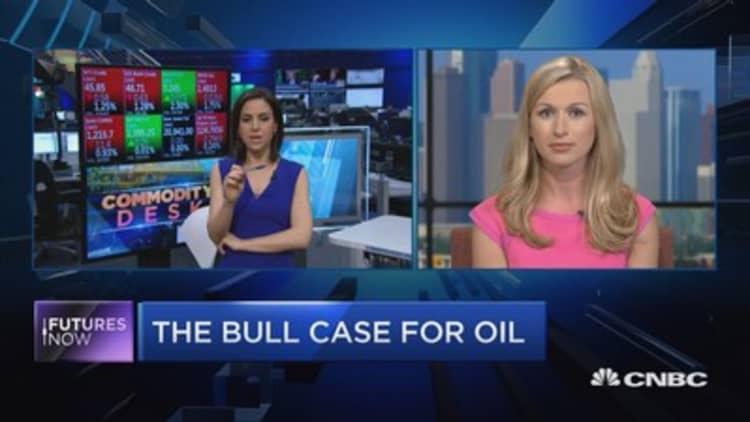The oil market is sending signals that it wants OPEC to not only extend production limits when it meets this
Slashing production below levels agreed to in November would threaten OPEC members' hold on key markets like Asia, which has lately turned to U.S. exports to fill the gap. It would also require another round of negotiations, following the contentious dealmaking that yielded last year's accord.
"I think they had a hard time getting this deal together, and I don't particularly think that most of the OPEC countries want to cut
"Now they're going to cut another couple thousand [barrels]? And how are they going to divvy that up?"
OPEC agreed to take 1.2 million barrels a day off the market through the first half of 2017. An agreement with 11 other exporters including Russia ratcheted up the cuts to about 1.8 million barrels a day.
[OPEC members] know for their own credibility's sake they have to at least extend the cuts. The question is what sort of sneaking will be done on the sidelines, because everyone still wants market share.Tamar EssnerNasdaq director of energy and utilities
That initially boosted oil prices above $50 a barrel, but futures have since fallen back into the $40s as U.S. drillers increase output, Libya restores sidelined supplies and OPEC exports decline more slowly than its production.
Consequently, OPEC has not reached its target level for shrinking global stockpiles, and some in the market are now speculating that OPEC must take even more oil off the market. Weak U.S. gasoline consumption and worries about Chinese commodity demand have further fed concerns.
Members have at least discussed the possibility of deeper cuts ahead of their May 25 meeting, four OPEC delegates told Bloomberg News. While that would likely achieve two of OPEC's objectives — boosting prices and driving global stockpiles down to their five-year average — it threatens to eat into cartel members' market share.
"I think OPEC is

Deeper cuts could also force oil prices sharply higher, further incentivizing U.S. drillers to boost output, Essner warned. The current deal should be sufficient to get OPEC to its inventory target assuming compliance remains high, she said.
"They know for their own credibility's sake they have to at least extend the cuts," she said. "The question is what sort of sneaking will be done on the
The OPEC deal could actually break down more quickly if the group cuts more deeply and forces oil prices above their recent range, said Bodhi Ganguli, lead economist at data and analytics firm Dun & Bradstreet.
"The higher the oil price, the higher the incentive to cheat," he said. Bodhi's risk team currently assigns just a 10 percent probability rate that OPEC will agree to more stringent reductions.
The oil market is very close to equilibrium, and crude demand should outpace supply in the coming quarters, said Anastasia Amoroso, global investment specialist at JPMorgan Private Bank. Global inventories should shrink as the oil market moves into deficit, she added.
"What that means for OPEC is that production would need to come up from the current levels in order to meet the demand," she told CNBC's "Futures Now" on Tuesday.

Oil prices rallied strongly on Wednesday after the U.S. Energy Information Administration reported a much larger-than-expected drop in the country's crude stockpiles and a recovery in gasoline demand in the past week.
Still, the market has not rewarded signals from Saudi Arabia,
Analysts are now asking whether OPEC has lost its ability to talk up the market. For some traders the memory of last year's Doha meeting, when Saudi Arabia unexpectedly scuttled a proposed deal to freeze output, is still fresh, said Helima Croft, global head of commodity strategy at RBC Capital Markets.
"It's kind of like the boy who cried wolf. We're all a bit savvier this time around," said Nasdaq's Essner.
Even if OPEC's decision disappoints traders, the market may be insulated against a sharp drop on the news, she said. That's because investors have reduced their bets that oil prices will rise to the lowest level since late November, according to Reuters analysis.
"I don't think there's


